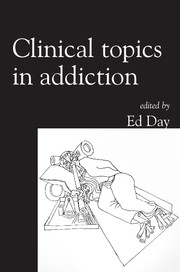Book contents
- Frontmatter
- Contents
- List of tables
- List of boxes
- List of figures
- List of contributors
- Foreword by Nat Wright
- Preface
- 1 What works in drug addiction?
- 2 The development of the drug treatment system in England
- 3 Stimulant use still going strong
- 4 Adverse effects of khat: a review
- 5 What the clinician needs to know about magic mushrooms
- 6 What works in alcohol use disorders?
- 7 Management of alcohol detoxification
- 8 Nicotine addiction and smoking cessation treatments
- 9 Pathological gambling: an overview of assessment and treatment
- 10 Use of investigations in the diagnosis and management of alcohol use disorders
- 11 Laboratory investigations for assessment and management of drug problems
- 12 Pharmacotherapy in dual diagnosis
- 13 Dual diagnosis: management within a psychosocial context
- 14 Treating depression complicated by substance misuse
- 15 Treating anxiety complicated by substance misuse
- 16 An overview of psychological interventions for addictive behaviours
- 17 Motivational interviewing
- 18 Substance misuse in adolescents
- 19 Management of drug misuse in pregnancy
- 20 Intoxication and legal defences
- 21 Substance misuse and violence: the scope and limitations of forensic psychiatry's role
- 22 Literary and biographical perspectives on substance use
- Index
8 - Nicotine addiction and smoking cessation treatments
Published online by Cambridge University Press: 02 January 2018
- Frontmatter
- Contents
- List of tables
- List of boxes
- List of figures
- List of contributors
- Foreword by Nat Wright
- Preface
- 1 What works in drug addiction?
- 2 The development of the drug treatment system in England
- 3 Stimulant use still going strong
- 4 Adverse effects of khat: a review
- 5 What the clinician needs to know about magic mushrooms
- 6 What works in alcohol use disorders?
- 7 Management of alcohol detoxification
- 8 Nicotine addiction and smoking cessation treatments
- 9 Pathological gambling: an overview of assessment and treatment
- 10 Use of investigations in the diagnosis and management of alcohol use disorders
- 11 Laboratory investigations for assessment and management of drug problems
- 12 Pharmacotherapy in dual diagnosis
- 13 Dual diagnosis: management within a psychosocial context
- 14 Treating depression complicated by substance misuse
- 15 Treating anxiety complicated by substance misuse
- 16 An overview of psychological interventions for addictive behaviours
- 17 Motivational interviewing
- 18 Substance misuse in adolescents
- 19 Management of drug misuse in pregnancy
- 20 Intoxication and legal defences
- 21 Substance misuse and violence: the scope and limitations of forensic psychiatry's role
- 22 Literary and biographical perspectives on substance use
- Index
Summary
Summary Tobacco smoking is the biggest public health problem in Western society and the biggest cause of preventable deaths. It persists primarily because of the highly addictive properties of nicotine, although many of the health problems arise from the inhalation of other chemicals. Techniques such as nicotine administration and group therapy have been developed to help people stop smoking. Although cessation rates with these are modest (perhaps 17% above the rates in control groups), they are eminently cost-effective, owing to the immense health problems produced by tobacco.
It is estimated that 29% of adults in the UK smoke tobacco (Office for National Statistics, 2000). Each year smoking kills 120 000 people (13 deaths per hour), making it the single most common preventable cause of death in Britain (Callum, 1998). Around half of all smokers will die prematurely because of their addiction (Peto et al, 1994). Their overall life expectancy is, on average, 8 years less than for non-smokers (Callum, 1998). About a decade ago it was estimated that smoking cost the National Health Service (NHS) £1500 million per year, with around 1000 admissions every day for smoking-related illnesses (Parrott et al, 1998). At the same time, the UK treasury earned £8 billion in tax on tobacco sold in the UK alone, in addition to the enormous revenue from overseas markets.
Smoking is a major risk factor for at least 20 diseases, including coronary and peripheral vascular disease, chronic bronchitis and at least 80% of lung cancers (Callum, 1998). Blood coagulates in smokers more easily than in non-smokers, fibrinogen levels are higher and platelets are more likely to aggregate. These effects all contribute to thromboembolic diseases. Although nicotine itself is not carcinogenic, tobacco smoke contains over 200 other compounds that are potential carcinogens and smoking itself is the greatest single risk factor for lung cancer. Cigarette smoking significantly contributes to several other nasopharyngeal and upper gastrointestinal carcinomas (Benowitz, 1988).
Is nicotine addictive?
A 1988 US Surgeon General's report stated that nicotine is as addictive as drugs such as heroin and cocaine (Stolerman & Jarvis, 1995). This represents the culmination of a gradual political shift from viewing smoking as a bad habit to seeing it as a behavioural form of habituation and, ultimately, a formal addiction (Box 8.1).
- Type
- Chapter
- Information
- Clinical Topics in Addiction , pp. 90 - 100Publisher: Royal College of PsychiatristsPrint publication year: 2007



